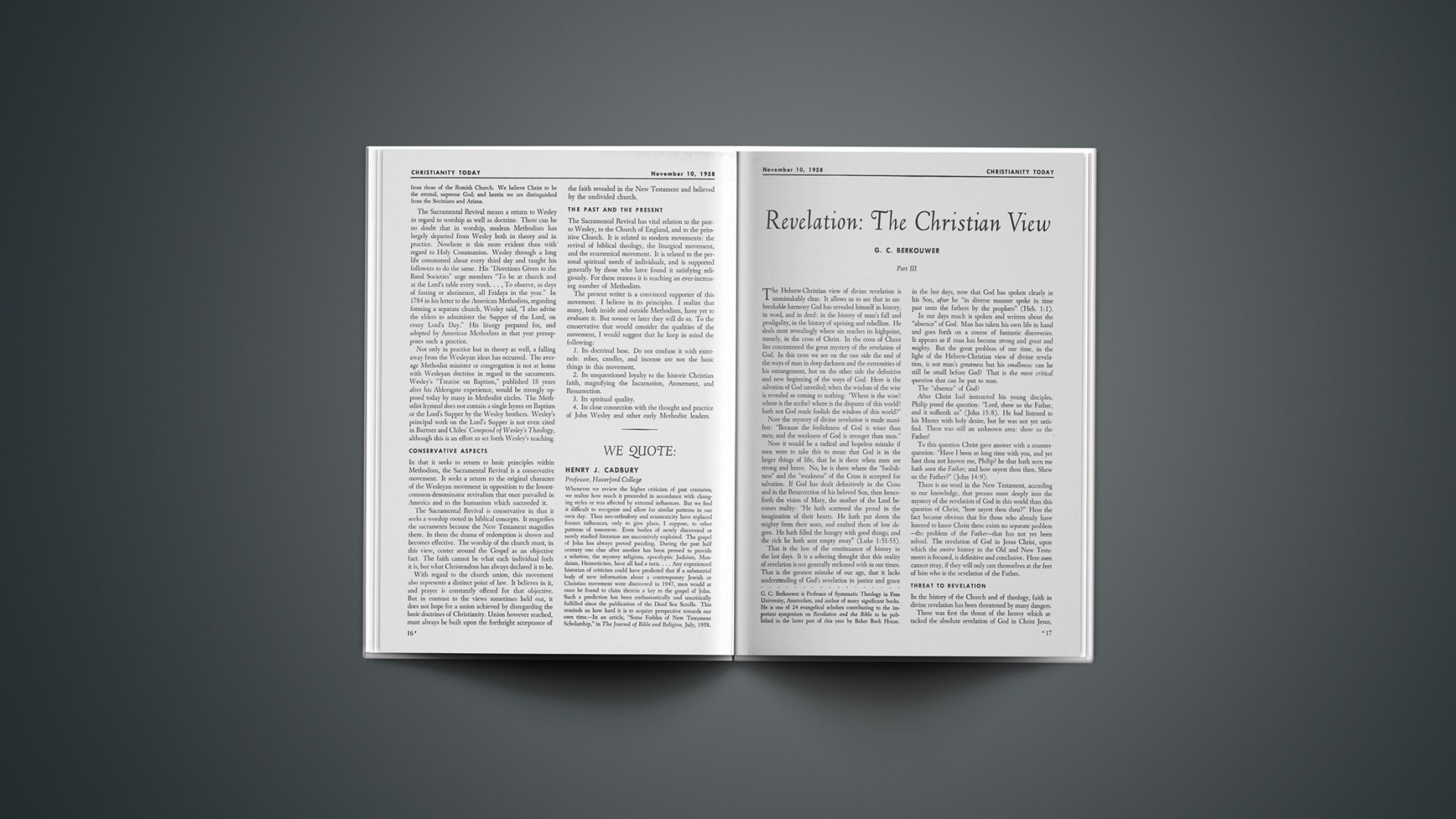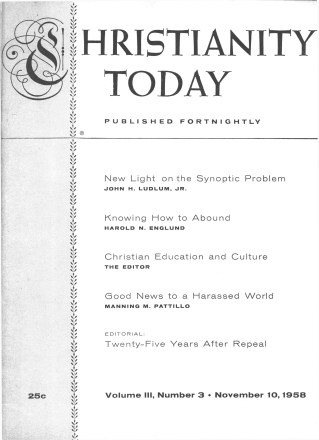The Hebrew-Christian view of divine revelation is unmistakably clear. It allows us to see that in unbreakable harmony God has revealed himself in history, in word, and in deed: in the history of man’s fall and prodigality, in the history of uprising and rebellion. He deals most revealingly where sin reaches its highpoint, namely, in the cross of Christ. In the cross of Christ lies concentrated the great mystery of the revelation of God. In this cross we see on the one side the end of the ways of man in deep darkness and the extremities of his estrangement, but on the other side the definitive and new beginning of the ways of God. Here is the salvation of God unveiled; when the wisdom of the wise is revealed as coming to nothing: “Where is the wise? where is the scribe? where is the disputer of this world? hath not God made foolish the wisdom of this world?”
Now the mystery of divine revelation is made manifest: “Because the foolishness of God is wiser than men; and the weakness of God is stronger than men.”
Now it would be a radical and hopeless mistake if men were to take this to mean that God is in the larger things of life, that he is there when men are strong and brave. No, he is there where the “foolishness” and the “weakness” of the Cross is accepted for salvation. If God has dealt definitively in the Cross and in the Resurrection of his beloved Son, then henceforth the vision of Mary, the mother of the Lord becomes reality: “He hath scattered the proud in the imagination of their hearts. He hath put down the mighty from their seats, and exalted them of low degree. He hath filled the hungry with good things; and the rich he hath sent empty away” (Luke 1:51–53).
That is the law of the continuance of history in the last days. It is a sobering thought that this reality of revelation is not generally reckoned with in our times. That is the greatest mistake of our age, that it lacks understanding of God’s revelation in justice and grace in the last days, now that God has spoken clearly in his Son, after he “in diverse manner spoke in time past unto the fathers by the prophets” (Heb. 1:1).
In our days much is spoken and written about the “absence” of God. Man has taken his own life in hand and goes forth on a course of fantastic discoveries. It appears as if man has become strong and great and mighty. But the great problem of our time, in the light of the Hebrew-Christian view of divine revelation, is not man’s greatness but his smallness: can he still be small before God? That is the most critical question that can be put to man.
The “absence” of God?
After Christ had instructed his young disciples, Philip posed the question: “Lord, show us the Father, and it sufficeth us” (John 15:8). He had listened to his Master with holy desire, but he was not yet satisfied. There was still an unknown area: show us the Father!
To this question Christ gave answer with a counter-question: “Have I been so long time with you, and yet hast thou not known me, Philip? he that hath seen me hath seen the Father; and how sayest thou then, Shew us the Father?” (John 14:9).
There is no word in the New Testament, according to our knowledge, that presses more deeply into the mystery of the revelation of God in this world than this question of Christ, “how sayest thou then?” Here the fact became obvious that for those who already have learned to know Christ there exists no separate problem—the problem of the Father—that has not yet been solved. The revelation of God in Jesus Christ, upon which the entire history in the Old and New Testaments is focused, is definitive and conclusive. Here men cannot stray, if they will only cast themselves at the feet of him who is the revelation of the Father.
Threat To Revelation
In the history of the Church and of theology, faith in divine revelation has been threatened by many dangers.
There was first the threat of the heresy which attacked the absolute revelation of God in Christ Jesus, and after long periods of violent struggle the Church gave expression to its confession in more certain terms.
In modern times the mystery of divine revelation has been brought to trial anew.
It is not accidental that almost always the great battles in the history of the Church have centered themselves on the confession of Christ and in the answer to the question: “But whom say ye that I am?” (Matt. 16:15). That is not a subordinate point in salvation, but the absolute core. Often the fierceness of the defense of the Church against modernism has been unjustly charged to intellectualism and traditionalism. But the source of this energetic defense lies deeply and principally in a decisive outlook on God’s revelation.
Naturally, the danger of intellectualism and even orthodoxism is always present with us. Men can speak about the truth of God in the same manner as the Pharisees spoke about the Law, while in their hearts they held themselves far from the Lord of the Law. So one can accept all the “truths” of the Christian faith, but in his heart be a stranger to them. But this erroneous path of intellectualism without faith, present danger that it is, may never allow us to leave the faith to be blurred out in a mystical emotion, in which we are not interested in what has happened. When Paul points to the Cross and the Resurrection, then he is not concerned with a mere intellectual acceptance of these truths, but he seeks faith and love, surrender and expectation, hope and adoration.
Just when the Church in our time feels compelled to confess the mystery of revelation over against many kinds of criticism, then we should also recall that the self-same Apostle Paul, who gloried in the Cross, also called out: “Though I speak with the tongues of men and of angels, and have not charity, I am become as sounding brass, or a tinkling cymbal. And though I have the gift of prophecy, and understand all mysteries, and all knowledge; and though I have all faith, so that I could remove mountains, and have not charity, I am nothing” (1 Cor. 13:1–2). This is a serious warning against a misunderstanding of divine revelation.
But another possibility exists. This we see in the witness of John, the apostle of love, who in the struggle of his days cried out in spirited defense: “Who is a liar but he that denieth that Jesus is the Christ? He is antichrist, that denieth the Father and the Son.”
Here love is tied in with indignation over the attacks on the great mystery. For John, everything hangs in the balances when that message is challenged. And the same John, at the end of his letter, warns with pressing earnestness: “Little children, keep yourselves from idols. Amen” (1 John 5:21).
Understandably, this letter, which is full of the revelation of God in Jesus Christ, ends with a warning against idols. For there only one decision: that between Jesus Christ and the idols. Other gods press themselves forward when the divine revelation of God in Christ is mistaken or denied. In the history of Israel, idols brought forth only darkness. Now people bow down no longer to idols of wood or of stone, but modern idols are also hard masters and we are still warned in the last days, “Little children: it is the last time.”
Summoning The Whole Man
If one thing is certain, it is this: our insight into the Hebrew-Christian view of divine revelation is not an intellectual game. It is, and must be, a matter of the heart. It concerns the revelation of the living God, the God who calls and who promises, who is merciful and just, and who has spoken to us through his Son.
And so completely is the entire Word of God made manifest in Christ that he once said to his disciples: “If any man serve me, him will my Father honor” (John 12:26). We can hardly fathom the reality and the riches of this Word. We can picture to ourselves that we are called to the soli Deo gloria—but here we read: “him will the Father honor”—not our worthiness but a glory of God upon him who serves the Son.
That is the secret of the future, when the full and deep significance of divine revelation in history shall be unveiled, and when the word shall sound forth: “It is done” (Rev. 21:6). Among all the redeemed on earth a longing already exists to understand more and more the mystery of the revelation of God in its breadth and its length, its depth and its height (Eph. 3:18). Only in this communion is it possible “to know the love of Christ, which passeth knowledge” (Eph. 3:19). This word of the Apostle Paul has been called paradoxical, but the paradox becomes known and in this knowledge is experienced as inexhaustible.
The Lamb And The Book
In all the ages of man his heart has been set on a search for the purpose of history. And always human thinking stretches itself to understand the past, the present and the future. But for many, history appears to be nothing more than “a book written within and on the back, sealed with seven seals” (Rev. 5:1). But the last book of the Bible gives the explanation of purpose through “a strong angel with a loud voice” (Rev. 5:2). “Weep not: behold, the Lion of the tribe of Juda, the Root of David, hath prevailed to open the book, and to loose the seven seals thereof.” (Rev. 5:5).
And even when the Lamb finally opens the book—for Christ Jesus is the purpose of history—there still remain depths in the revelation of God that we do not thoroughly understand. “How unsearchable are his judgments, and his ways past finding out!” But they are and remain “the depths of the riches both of the wisdom and knowledge of God!” (Rom. 11:33).
END
G. C. Berkouwer is Professor of Systematic Theology in Free University, Amsterdam, and author of many significant books. He is one of 24 evangelical scholars contributing to the important symposium on Revelation and the Bible to be published in the latter part of this year by Baker Book House.










